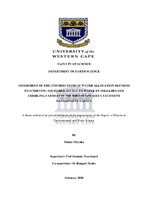| dc.description.abstract | The National Water Act of (1998) of South Africa has a goal of achieving equitable access to
water resources, as well as achieving environmental sustainability and efficient use of water.
Consequently, water resources management is being reformed to ensure the achievement of
these principles. Allocation of water through granting of licenses for abstraction and storage of
water has been implemented to ensure that historically disadvantaged individuals (HDIs) have
access to water and to promote sustainable, efficient and beneficial use of water resources for
the whole country. The Water Allocation Reform Policy is a tool that is used to implement the
goal of the National Water Act and it is guided by the set objectives, which are to allocate 30%
of all water to previously disadvantaged individuals by 2014, 45% by 2019 and 60% by 2025.
Despite these efforts, there is evidence that smallholder emerging farmers who are part of the
disadvantaged groups do not have access to water for productive use. Many studies conducted
so far have shown that equitable, sustainable and efficient water allocation has not been
achieved in South Africa. It is not very clear why this trend is continuing despite all efforts to
the contrary. The aim of the study was to assess the contribution of the reforms of water
allocation systems towards increasing access to water by historically disadvantaged groups in
Barrydale area in the Western Cape Province, South Africa. Interviews were conducted to
determine how the reforms have influenced access to water for productive use by smallholder
emerging farmers. Document review was undertaken to determine the progress in the
implementation of the water allocation reform by the Breede-Overberg Catchment
Management Agency (BGCMA). The results indicated that small-scale farmers do not have
access to water for agricultural activities in Barrydale due to lack of components, which include
financial funding, access to farming infrastructure and skills. The BGCMA has not completed
the implementation of the Water Allocation Reform and as a result, mechanisms initiated by
the BGCMA have not resulted in improved access to water by HDIs. The outcome of the study
indicated a lack of implementation of the water allocation reforms by the BGCMA, hence there
is still no increase to water access for agricultural use by HDIs. | |

